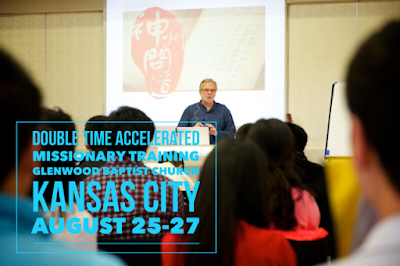Thursday, December 08, 2016
Thursday, November 03, 2016
Online Missionary Training Enrollment
Thursday, May 19, 2016
Just In Time Learning
To learn more about JIT in KC August 23 - 25 go to this link.
Monday, September 07, 2015
Keys To Effective Missionary Training
Through a partnership between LCCTI and Glenwood Baptist Church in Kansas City, we provided a missionary training program called Double Time last week. Here are four keys that made it successful.
1. LEARNERS - There are three types of people who attend special meetings: Prisoners (they are there because someone made them attend - Visitors (love to fellowship, eat and have a good time) - Learners…obviously serious students with a focus. Those who attended DOUBLE TIME this year were motivated learners.
2. ACCOMODATIONS – Environment goes a long way in setting the tone for classes. If the motel breakfast is a bagel in a bag hung on the room door and cockroaches on the shower floor begins the day, class time is already has an uphill climb. DT students commented that they really appreciated their accommodations.
Saturday, May 30, 2015
Forty Year Veteran Missionary
Like many missionaries in my day, and still true today, my preparation for overseas work was limited to theology courses. Good stuff, necessary for the task of ministry, but woefully lacking in how to take what I knew to a people group that were illiterate, tribal and animistic. Thirty years later I am still learning how cultures work and how best to enter into a specific culture that is contextual and more culturally relevant.
Tuesday, May 19, 2015
Missionary Training Opportunity
 TIME and MONEY. Those
are the two things that I must consider in everything I do. When someone invites me to teach
cross-cultural missions I always have to check two things…my budget and my
calendar.
TIME and MONEY. Those
are the two things that I must consider in everything I do. When someone invites me to teach
cross-cultural missions I always have to check two things…my budget and my
calendar.In a recent survey I asked how many pastors would be willing to underwrite the cost of training for their missionaries. Over 75% said they would. I encourage pastors to send their missionary candidates to DOUBLE TIME, and for the missionary wanting to attend this class I suggest they approach their donors to help in the cost.
Sunday, July 27, 2014
Monday, April 15, 2013
Survey Results: Missionary Training
- I'd add location relevant/contextualized vocational/professional training.-
- Finance
-Effective training on the field of choice.
- Interpersonal/problem solving skills with other missionaries.
- Missionaries are trained in tandem - both spouses together along with missionary teams.- Study of the book, "When Helping Hurts.’
- Working with adult ministries before going to the field.
- Cross-cultural leadership development: Leadership models, tools, strategies, & etc. Internships should be done in a cross cultural setting.
- How to raise support.
- Practical - eg: Auto repair.
- Ethics and some foundational business principles.
- Training in a profession for admission to a country where missionaries as such are not allowed, i.e. medical, dental, or nursing.
- Common sense.
Tuesday, August 09, 2011
LCCTI Missionary Training

Wednesday, June 08, 2011
New Missionary Training Program: BYOTP

I received a call from a couple going to Haiti yesterday. They belong to a small mission organization that has an orphanage in that country and know they need some training before going to the field. They have five kids, can’t afford to uproot their family and go to school, so they contacted me. My advice was for them to find at least five people who needed training and I would be willing to set up a training program. After the call my thoughts took on more definition and I came up with BYOT (Build Your Own Training Program – not Bring Your Own Toilet Paper).
The details of BYOTP is on the website. I will give more information on how it works to those who contact me through email. I prefer 15 days, but if a person only has one week, we can give them a crash course that is better than nothing. Build your own training program, but by all means do something. Going to the field without any preparation is harmful to the missionary, family and people they work with.






